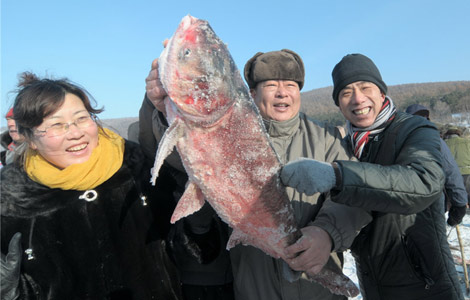Abe stepping up military agenda
Updated: 2013-12-30 01:04
By ZHANG YUNBI (China Daily)
|
||||||||
Leading security adviser touts the right to 'collective self-defense' and joint sea patrols
|
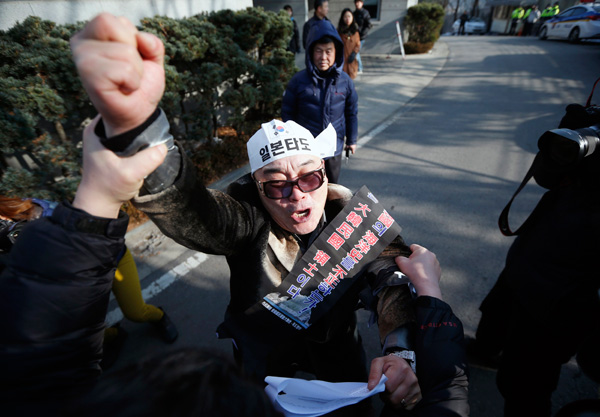 |
|
A South Korean protester is stopped by policemen as he chants slogans denouncing Japanese Prime Minister Shinzo Abe's visit to the Yasukuni Shrine in front of the official residence of the Japanese ambassador in Seoul on Friday. Kim Hong-ji / Reuters |
Japanese Prime Minister Shinzo Abe is pressing ahead with his long-time goal of removing constitutional restrictions on a military buildup, despite worldwide criticism over his visit last week to the Yasukuni Shrine for the war dead, analysts said.
The steps Abe will take may include allowing Japanese armed forces to join other countries in patrolling maritime routes on the high seas — a move currently unconstitutional — and engaging US help to eliminate procedural obstacles to rewriting Japan's pacifist Constitution, according to Tokyo's policy insiders.
Shinichi Kitaoka, a former Japanese ambassador to the United Nations and a key security adviser to Abe, told leading Japanese newspaper Yomiuri Shimbun on Sunday that the "right to collective self-defense" — illegal under the existing official interpretation of Japan's Constitution — should be allowed, to enable Japanese Self-Defense Forces to participate in joint patrols safeguarding the "sea lanes" for crude oil shipping.
Joint patrols along high-sea routes — spanning from the Middle East via the South China Sea to Japan — are part of the "proposal summary" of a key governmental security policy consulting panel, said Kitaoka, acting president of the advisory panel.
Zhang Boyu, deputy director of the Department of Japanese Politics at the Institute of Japan Studies under the Chinese Academy of Social Sciences, said Abe and his Cabinet will not give up on revising the Constitution.
"Abe's ultimate goal is to overthrow the pacifist Constitution, and future procedural steps will be taken little by little to make the law exist only nominally," Zhang said.
The topic on enabling collective self-defense was not played down after Abe on Thursday became the first sitting Japanese prime minister in years to visit the Yasukuni Shrine, which honors 14 class-A war criminals from World War II.
Meng Xiangqing, a professor at the PLA's National Defense University, said the Abe cabinet has already conducted an assessment on the timing of the push for constitutional revision, and Tokyo now believes "it is time" because of a range of legislative preparations that have been in place.
The US embassy in Japan and US State Department expressed "rare disappointment" because Abe is damaging Japan's relationship with South Korea, another US ally, and causing wider problems for the US, said Jin Canrong, a professor of international relations at Renmin University of China in Beijing.
"Japan is undermining the entire US rebalancing strategy in Asia," Jin said. "Washington does not feel safe with regard to Tokyo. There is a rift between them."
In an appearance on Japan's national television network NHK on Dec 22 — four days before the shrine visit — Kitaoka confirmed that his panel will propose a report next spring suggesting that the government lift the ban on exercising the right of collective self-defense.
He indicated that exercising collective self-defense will also be on the agenda when the US and Japan revise their defense cooperation guidelines, an overhaul expected before the end of next year.
Containing China, boosting the US-Japan alliance and "enabling Japan's collective self-defense to ask Japan to share more of the US burden of military deployment in East Asia" are probably on the agenda of the guidelines overhaul, said Liu Jiangyong, an expert on Japanese studies and the deputy dean of the Institute of Modern International Relations at Tsinghua University.
"It remains to be seen how Washington and Tokyo will deepen their defense cooperation," Liu said.
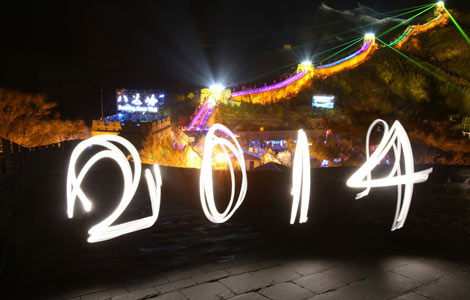
 Revellers embrace the New Year at Great Wall
Revellers embrace the New Year at Great Wall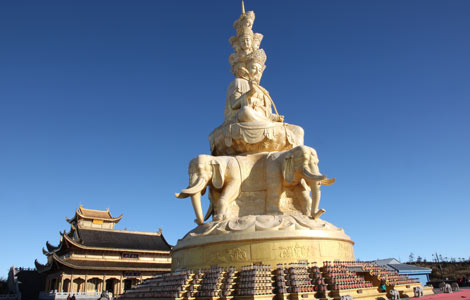
 Sacred mountain of wonders
Sacred mountain of wonders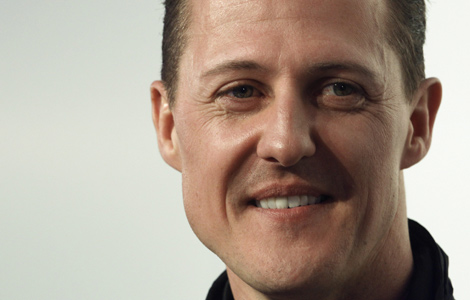
 Doctors give no prognosis for Schumacher
Doctors give no prognosis for Schumacher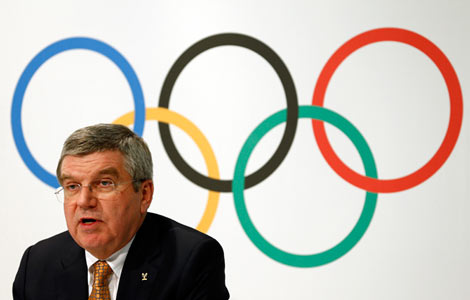
 IOC boss expects 'safe' Sochi Games
IOC boss expects 'safe' Sochi Games
 Education reform pushed forward
Education reform pushed forward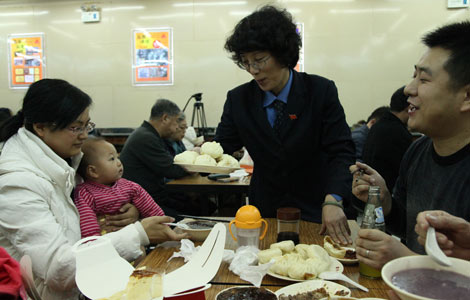
 Tale of Xi's dumplings draws crowd
Tale of Xi's dumplings draws crowd
 Second blast kills 14 in Russian city
Second blast kills 14 in Russian city
 F1 legend Schumacher in coma after ski accident
F1 legend Schumacher in coma after ski accident
Most Viewed
Editor's Picks

|

|

|

|

|

|
Today's Top News
Putin vows to annihilate "terrorists" after suicide bombings
China ready to further advance ties with US
US consumer mood brightens
Iran says nuclear deal to be implemented in late Jan
US analysts think Abe's shrine visit a mistake
Xi's bun shop visit wows media
Cities go live with air quality updates
Second kid 'easier said than done'
US Weekly

|

|



